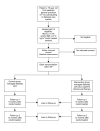The effectiveness of adding cognitive behavioural therapy aimed at changing lifestyle to managed diabetes care for patients with type 2 diabetes: design of a randomised controlled trial
- PMID: 17488511
- PMCID: PMC1876216
- DOI: 10.1186/1471-2458-7-74
The effectiveness of adding cognitive behavioural therapy aimed at changing lifestyle to managed diabetes care for patients with type 2 diabetes: design of a randomised controlled trial
Abstract
Background: In patients with type 2 diabetes, the risk for cardiovascular disease is substantial. To achieve a more favourable risk profile, lifestyle changes on diet, physical activity and smoking status are needed. This will involve changes in behaviour, which is difficult to achieve. Cognitive behavioural therapies focussing on self-management have been shown to be effective. We have developed an intervention combining techniques of Motivational Interviewing (MI) and Problem Solving Treatment (PST). The aim of our study is to investigate if adding a combined behavioural intervention to managed care, is effective in achieving changes in lifestyle and cardiovascular risk profile.
Methods: Patients with type 2 diabetes will be selected from general practices (n = 13), who are participating in a managed diabetes care system. Patients will be randomised into an intervention group receiving cognitive behaviour therapy (CBT) in addition to managed care, and a control group that will receive managed care only. The CBT consists of three to six individual sessions of 30 minutes to increase the patient's motivation, by using principles of MI, and ability to change their lifestyle, by using PST. The first session will start with a risk assessment of diabetes complications that will be used to focus the intervention. The primary outcome measure is the difference between intervention and control group in change in cardiovascular risk score. For this purpose blood pressure, HbA1c, total and HDL-cholesterol and smoking status will be assessed. Secondary outcome measures are quality of life, patient satisfaction, physical activity, eating behaviour, smoking status, depression and determinants of behaviour change. Differences between changes in the two groups will be analysed according to the intention-to-treat principle, with 95% confidence intervals. The power calculation is based on the risk for cardiovascular disease and we calculated that 97 patients should be included in every group.
Discussion: Cognitive behavioural therapy may improve self-management and thus strengthen managed diabetes care. This should result in changes in lifestyle and cardiovascular risk profile. In addition, we also expect an improvement of quality of life and patient satisfaction.
Trial registration: Current Controlled Trials ISRCTN12666286.
References
-
- Wei M, Gibbons LW, Mitchell TL, Kampert JB, Lee CD, Blair SN. The association between cardiorespiratory fitness and impaired fasting glucose and type 2 diabetes mellitus in men. Ann Intern Med. 1999;130:89–96. - PubMed
-
- Wei M, Gibbons LW, Kampert JB, Nichaman MZ, Blair SN. Low cardiorespiratory fitness and physical inactivity as predictors of mortality in men with type 2 diabetes. Ann Intern Med. 2000;132:605–611. - PubMed
Publication types
MeSH terms
Associated data
LinkOut - more resources
Full Text Sources
Medical


